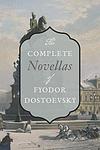Poor Folk by Fyodor Dostoevsky
The novel unfolds as a poignant exchange of letters between two impoverished relatives, an elderly clerk and a young woman, who share their struggles, hopes, and the grim reality of their lives in 19th-century St. Petersburg. Their correspondence reveals the depth of their bond and the social pressures that keep them trapped in poverty. Through their heartfelt and sometimes despairing messages, the narrative paints a vivid picture of the harsh societal conditions of the time, exploring themes of poverty, class, and the human desire for dignity and connection amidst adversity.
The 3777th greatest book of all time
Ranking Details:
Our ranking system awards points to books based on their appearance and position on curated lists. Here's how it works:
Unranked Lists: For lists without specific rankings, each book receives points equivalent to the list's weight. This approach recognizes the book's inclusion on prestigious lists.
Ranked Lists: Books on ranked lists receive points in two ways:
- Base Points: Initially, every book is awarded points equal to the list's weight, acknowledging its significance.
- Bonus Points: Additionally, books earn bonus points based on their ranking. The total bonus pool, equal to 100% of the list's weight, is distributed among the books, with higher-ranked books receiving more points.
Exponential Distribution: The distribution of bonus points follows an exponential model. This means the top-ranked book (#1) receives significantly more bonus points than those further down the list (e.g., #100). Our algorithm ensures that higher placements are rewarded more generously, reflecting the achievement of a top rank on any given list.
This scoring system ensures that each book's ranking reflects both its presence on multiple lists and its positions within those lists, providing a comprehensive measure of its acclaim and popularity.
Total Points: 102
Since this book was first published in 1846, there is a penalty of 0%. The age adjusted score is 102.0.
This is to prevent newer books from reaching super high on the ranked list of the greatest books of all time. The greatest books should also stand the test of time.
- score: 102 -- The Main Works of Russian literature (Weight: 102)

